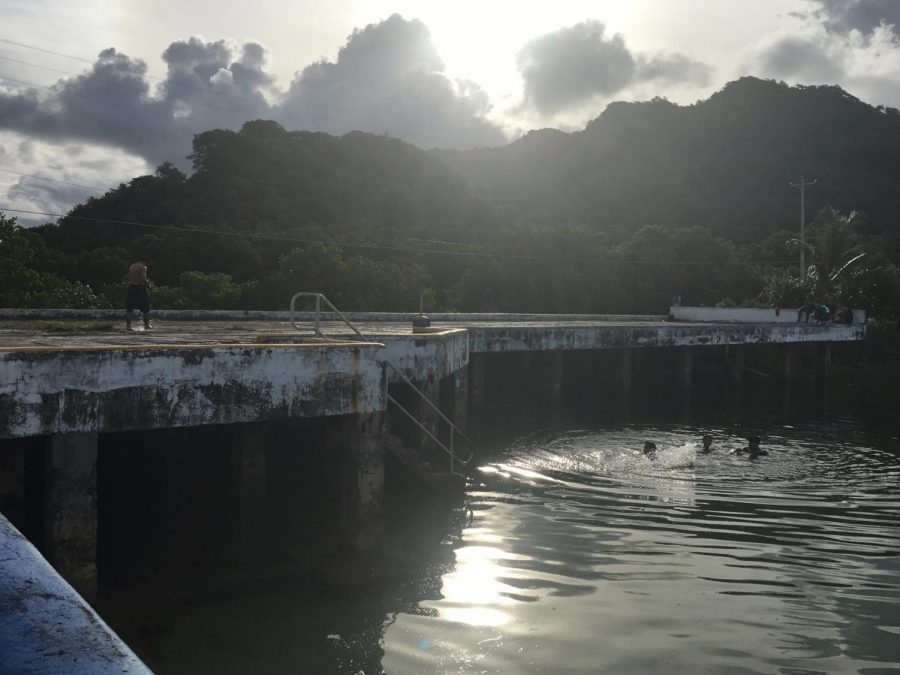Opinion: Kosrae Fails to Prepare for Covid-19
The Blue Hole, located in Lelu, Kosrae, is the island’s most popular swimming spot. Passing by the area, it is expected to see waves of visitors jumping 7 ft into the water.
On March 31, the government of Kosrae, Micronesia, held its annual Cultural Day celebration, which saw all four villages gather at the state’s capital showcasing traditional chants, dishes, and handicrafts. There, attendees were treated to free food, entertainment, and a baffling remark by governor Carson Sigrah. He claims that the island’s only hospital, which hardly has enough beds and supplies to hold 50 patients at a time, has enough cough medicine and Tylenol in case the virus sneaks its way onto the island.
Kosrae is a small island that has so far avoided Covid-19 but still has fallen prey to the ignorance that has plagued some global leaders. Despite news of the virus’s effects and suggestions by medical experts for people to practice social distancing, the government continues to prioritize its comfortable routine over the health of its citizens. For those like myself who call Kosrae their home but have no way to provide immediate aid, it is disheartening seeing appointed officials brush off a disease that had already stolen thousands of lives from around the world.
Kosrae is a 42 square mile island state of the Federated States of Micronesia with a population of about 6,000 along its coasts. The minimum wage is one can of Coca-Cola per hour and having internet access at home would consider one as high class. There are no traffic lights nor sidewalks, but there is a 3G data service that was established by the local telecom last summer … that can only reach one of the four island’s villages. Kosrae lacks modernity, but its most damning trait is its lack of understanding of Covid-19’s severity.
According to Worldometers, as of April 22, there have been about 2.5 million recorded cases of Covid-19 around the world with the death total passing 178,000. The most striking detail about these numbers is that the illness was able to reach those figures within four months. Though both Covid-19 and the flu attack the respiratory system and have similar symptoms, the major difference between the two is their ability to spread from person to person.
According to the Centers for Disease Control and Prevention, the time it takes for one with Covid-19 to feel sick can take anywhere from 5-14 days from infection, while the flu, on the other hand, usually takes two. Normally, an illness becomes contagious when one begins to feel symptoms. However with Covid-19, transmission can occur as soon as one contracts it. The fact that it is also an entirely new disease that the human body has yet to encounter makes it a danger to dense communities, especially those that force high school students to attend classes and hold island-wide gatherings.
In addition to March’s Cultural Day in Kosrae, everyday activities on the island remained untouched. Every Sunday, hundreds still congregate in their village’s church sitting knee-to-knee, and on the weekdays, the island’s youth are sent to an unsanitary school that has as much betel nut spit stains than paint on its walls.
My uncle, Kun, is a 47-year-old veteran who has two kids currently enrolled at the island’s only high school. Since the birth of my two cousins, my uncle exercised intense care as they were both born with a combination of health conditions such as asthma and numerous allergic reactions that at times saw them on trips to the emergency room.
In early March, when countries around the world declared Covid-19 as a serious threat, my uncle withdrew my cousins from school in concern for their health. They have yet to attend a single class, but are now facing an expulsion threat for attendance by the institution because governor Sigrah sees Covid-19 like the common flu.
On March 30, Kosrae’s knee-jerk response to the Covid-19 scare was to put together a self-congratulatory Risk Communication Committee that would visit every village holding a seminar about the dangers of Covid-19 and ways to prevent its spread. Also, in response to parents reasonably worrying about their children’s health, the governor also decided to have high school graduation moved forward from May 21 to April 23. Sending students back home early without a plan to restrict outdoor activities, however, shoves the blame onto parents if their kids were then tested positive.
The only strip of tape that holds the governor’s ego afloat is that there are no confirmed cases of Covid-19 on the island. The key word, though, in that statement is “confirmed.” The world is dealing with its most silent and swiftest menace in recent memory and the illness has proven to infect people before being found on one. There have been no reports by the Kosrae government that it has the resources to test citizens for Covid-19 nor the necessary amount of medicine in case of a large-scale spread
The best way for Kosrae to combat this issue given its circumstances is to determine which activities are essential and which can be done at home. Religious services can easily be done at home since most Kosraean churches supply churchgoers with a free Bible and a list that includes a daily passage for readers to study. Restrictions at shopping at centers and patrol over public sites would also install a sense of urgency to the public. Citizens would have to put in the energy to contain the risk of spread while the government needs to enforce these views for the sake of the island’s safety.
It’s frustrating to see the a lack of action on part of the Kosrae state officials. Despite Covid-19’s constant presence in headlines, government officials choose to march onward eyes-closed upholding their own misguided principles.
